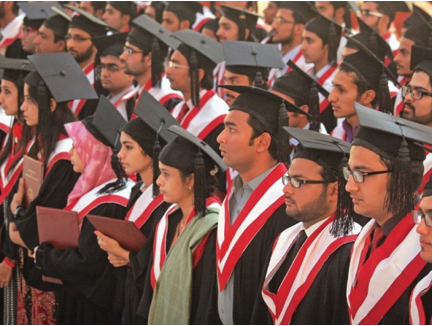INP-WealthPk
Muhammad Faisal Kaleem
The private universities’ enrolments have significantly increased by 16% over the past three years, rising from 113,618 in 2021-22 to 150,127 in 2023-24 amid growing higher education demand, reports Wealth Pakistan. The Federal Ministry of Education and Professional Training compiled data on students admitted to public and private universities across the country.
According to the documents, in 2021-22, 113,618 students enrolled in private sector universities or higher education institutions (HEIs) for different disciplines across the country. The enrollments steadily increased to 130,603 in 2022-23 and onward to 150,127 students in 2023-24. Similarly, enrollments at public universities also increased significantly. According to the data, 555,214 students enrolled in 2021-22, 578,963 students in 2022-23, and 603,728 in 2023-24.
Overall, the accumulated increment percentage of admissions in private and public sector varsities remained at 6.3%, including 668,832 in 2021-22, 709,566 in 2022-23, and 752,781 students in 2023-24. Province-wise, 8,095 students got admissions in 2021-22 in AJ&K, 7,900 in 2022-23, and 7,859 students in 2023-24. In Balochistan, 11,357 students enrolled in 2021-22, 10,885 in 2022-23, and 10,997 in 2023-24. In Islamabad Capital Territory (ICT), 267,013 students enrolled in 2021-22, 284,239 in 2022-23, and 294,838 in 2023-24.
In Gilgit Baltistan (GB), 3,519 students enrolled in 2021-22, 2,626 in 2022-23, and 2,681 in 2023-24. In Khyber Pakhtunkhwa (KP), 63,789 students enrolled in 2021-22, 64,090 in 2022-23, and 64,391 in 2023-24. In Punjab, 224,641 students enrolled in 2021-22, 242,620 in 2022-23, and 272,263 in 2023-24. In Sindh, 90,418 students enrolled in 2021-22, 97,206 in 2022-23, and 99,752 in 2023-24. According to a document of the Higher Education Commission (HEC), the Commission has played a key role in establishing new universities and sub-campuses in underserved and remote areas to improve access to higher education.
The federal government allocates a development budget through specific projects aimed at both hard and soft interventions in universities. These include infrastructure development such as new campuses, academic and administrative blocks, hostels, and laboratories; human resource development; establishment, enhancement, and upgrading of laboratories and equipment; faculty development; procurement of transport; improvement of ICT infrastructure; and support for extracurricular activities. The development portfolio of the HEC for the FY2025-26 is Rs39.0 billion for 140 projects.
The government, through special schemes/projects, also offered merit and need-based scholarships at undergraduate, postgraduate, and post-doctoral levels to promote access to higher education. Faculty development programs were launched to enhance the teaching, research, and professional skills of university faculty members to ensure high-quality education and academic excellence. The HEC supports research, innovation, commercialization, and the entrepreneurial ecosystem in the country to enable the HEIs in Pakistan to become hubs of economic growth and contribute to the socio-economic development of the country.
The research programs include National Research Program for Universities (NRPU), Technology Development Fund (TDF), Research and Innovation Grants under Higher Education Development in Pakistan (HEDP) project, Grand Challenge Fund (GCF), Local Challenge Fund (LCF), Technology Transfer Support Fund (TTSF), Rapid Research Grant (RRG), and Center of Excellence Grant (COE). Besides this, the International Collaborative Research Grants project also focused on joint research collaborations between Pakistani universities and international academic and sectoral partners.
Moreover, in order to enhance digital literacy across the country, the government initiated Prime Minister’s Laptop Scheme, Smart Universities (Transformation through Smart Classrooms), PERN Connectivity in Universities, Digital Library, Digital Learning and Skill Enrichment Initiative (DELSI), National Video Conferencing Network, Education Transformation Agreement (ETA), Microsoft Certifications, Huawei ICT Academy Program, and Higher Education TV channel.

Credit: INP-WealthPk













